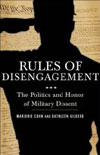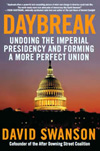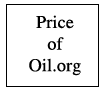ExxonMobil Laps up Iraq War Profits
“EXXON GUNS FOR ALL-TIME PROFIT RECORD” declared CNNMoney.com on January 23, 2008, explaining:
“ExxonMobil, the world’s largest publicly traded oil company, is within striking distance of setting an all-time profit record – again.”
As ExxonMobil prepares to celebrate what could be a record profit of more than $10 billion for the last quarter of 2007, jubilant company officials and stockholders might want to join in a moment of silence for the more than one million war dead in Iraq – Iraqi and American combined. They paid the ultimate price in a war in which ExxonMobil has had a hand and which we can estimate is responsible for at least $2.5 billion of ExxonMobil’s latest profit.
This estimate of ExxonMobil’s war profit, between 20 and 30 percent of its overall profit, was kindly provided at my request by Dean Baker, economist and co-diretor of the Center for Economic and Policy Policy Research, who said that the excess profit can be traced to: (1) the loss of at least one million barrels a day of Iraqi oil production due to the war; and (2) “the additional uncertainty about supplies created by the war.”
“I’m just speculating,” Dr. Baker says, “but the price of oil is probably about $10 to $22 a barrel higher because of the war” attributed to the two factors noted above. “If (oil) prices were 10 – 20 percent lower, Exxon’s profits might be 20 – 30 percent lower.”
Dr. Baker, who has testified before Congress on the oil industry, specializes in evaluating the social costs of political decisions, studying housing, Social Security and Medicare, as well as oil.
What this analysis means is that the Iraq War is not only a major factor in the profits of ExxonMobil and other major oil companies, but in the cost of gasoline and petroleum products in the U.S. and around the world. The $150 billion plus economic stimulus package before Congress is prompted in part by the oil price inflation besetting U.S. consumers.
CNN reports that: “For every $1 (a barrel increase) in the price of oil, Exxon makes (another) $125 million for the quarter…Exxon is expected to make $39.2 billion for all of 2007, just shy of its previous record of $39.5 billion in 2006, which breaks down to the company earning about $75,000 a minute.”
ExxonMobil benefits greatly from the Iraq War not only because of the inflation of oil prices but because it is among the largest sellers of petroleum products to the Pentagon. ExxonMobil received more than $4.2 billion from sales to the U.S. military between FY 2003 and 2007. The other two top sellers to the Pentagon for this period are: Shell - $5.6 billion; and BP - $4.7 billion.
There is strong circumstantial evidence that ExxonMobil and several other of the oil majors encouraged the invasion of Iraq because of its vast pools of oil. Further, there is also an indication that ExxonMobil, along with other Western oil companies, was involved prior to the 2003 invasion in defining a new oil law for Iraq that would bring the firms exceptional profits. That law, backed by the U.S. Congress, has met strong opposition in Iraq, particularly from Iraqi oil workers. More information on ExxonMobil’s relationship to the Iraq War can be found at www.consumersforpeace.org.
ExxonMobil, Shell, BP, Chevron, ConocoPhillips, Valero and Marathon now import Iraqi oil for refining in the U.S. What they seek in the new oil law is significant, long-term control of Iraqi oil at prices more favorable than they pay in most other nations.
The idea that the Iraq War and its incendiary potential for the Middle East are contributing to oil price inflation is reinforced in the 2006 report “The Economic Cost of the Iraq War: An Appraisal Three Years After the Beginning of the Conflict” by Linda Bilmes and Joseph Stiglitz:
“We believe…the impact of Iraq on oil prices is a large proportion of the $45-a-barrel increase since the war began…Given U.S. imports of roughly five billion barrels a year, a $10-per-barrel increase translates into an extra expenditure of approximately $50 billion. Americans are poorer by that amount…if we base our estimates on a $10 price increase, and assume…it extends for a least six years, the cost is $300 billion.”
They go on to say that the impact of this increased cost results in reduced consumer purchasing and economic output which, over the six-year period just mentioned, could raise the total cost to the U.S. economy to $450 billion. This level of cost is one that might be used to measure the effectiveness of the amount in the current economic stimulus package, suggesting that it is likely be just the first of a series.
Professor Bilmes, former Assistant Secretary and Chief Financial Officer of the U.S. Department of Commerce, teaches public finance at Harvard’s Kennedy School. Professor Stiglitz, winner of the Nobel Prize for economics in 2001 and a former chair of the Council of Economic Advisors, teaches economics at Columbia University.
(Note: A petition in support of the Big Three Oil Boycott against ExxonMobil, Shell and BP, to be conducted until all U.S. forces are out of Iraq, can be accessed at www.consumersforpeace.org, as well as the Consumer’s Guide to Gasoline, offering a listing of alternative brands.)
Nick Mottern has worked as a reporter for the Providence (RI) Journal and Evening Bulletin and the former newsletter Consumer News, as a researcher and writer for the former Senate Select Committee on Nutrition and Human Needs, as a lobbyist for Bread for the World, as a writer and organizer for Maryknoll Fathers and Brothers and as an organizer in New York’s Hudson Valley. He is a member of the board of Traprock Peace Center in Greenfield, MA.





